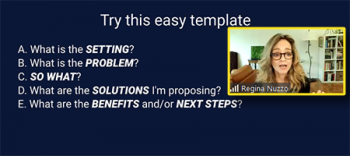
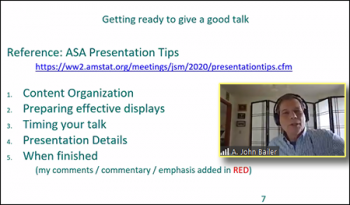
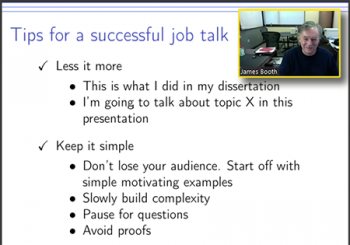
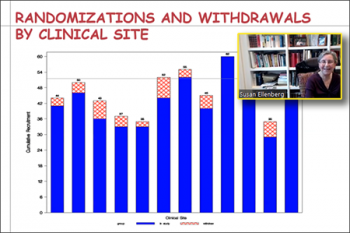
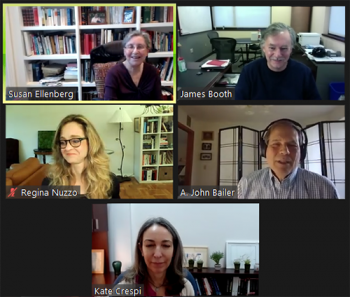
Sharing your ideas effectively is a critical skill for a statistician! You might be applying for a position, presenting your work at a conference or to clients at a meeting. It is vitally important that you connect with your audience and get your key ideas across. How many of us do this well? What are the things to keep in mind?
The NISS Academic Affiliates committee brought together a panel of four statisticians with just this type of expertise and experience - communicating statistical ideas to diverse audiences. The four distinguished panelists included Regina Nuzzo (Senior Advisor for Statistics Communication and Media Innovation, American Statistical Association and Professor, Gallaudet University), John Bailer (University Distinguished Professor and Chair, Department of Statistics, Miami University, and President, International Statistical Institute), James Booth (Professor and Director of Graduate Studies, Department of Statistics and Data Science, Cornell University) and Susan Ellenberg (Professor of Biostatistics, Medical Ethics and Health Policy and Interim Chair, Department of Biostatistics, Epidemiology and Informatics, University of Pennsylvania Perelman School of Medicine).
Regina Nuzzo (American Statistical Association) started off talking about aliens. No, she is not a conspiracy theorist, but her analogy of non-statisticians as individuals that do not share the same foundational understanding and knowledge as statisticians was a unique way to highlight her central point of how intentional you need to be in order to effectively communicate your work to a different audience. Regina then proceeded to provide concrete, realistic approaches in doing this. First, she walked through an example using an effective and very easy-to-use template to organize and reshape your ideas, which involved articulating the Setting, Problem, “So what?”, Solution and Benefits. Regina closed by sharing a fun tool by xkcd’s Randall Munroe called SimpleWriter, which helps you write using only the thousand most common words in English. Regina’s ideas and advice were things anyone can – and should – do!
“They might be signing the check or making the decisions that directly affect you!”
Regina Nuzzo (ASA)
John Bailer (Miami University) took a very different approach. Instead of providing advice about giving a good talk, his “tongue in cheek” approach provided the opposite! Now, I don’t think anyone wants to give a really bad talk, but as John sarcastically went through each one of his “rules”, he made it clear how the opposite was really true. For instance, “Don’t plan too carefully, “improv” is the name of the game with technical talks.” What? Of course not! Planning is critical! Point by point he proceeded in this way, helping the audience understand what to do by demonstrating what not to do. Eventually he came around and succinctly listed his advice for giving a good talk.
James Booth (Cornell University) focused his remarks on advice for interviewing for an academic position and in giving a job talk. Simple tips were the hallmark of his comments. James explained what he meant by advice such as “Less is More” (maintaining focus on what you are sharing) and “Keep it Simple” (start off with simple motivating examples and slowly build in complexity) along with a number of other tips that would certainly worth taking to heart. In terms of the interview itself, James asserted that is was important to do your homework regarding the department you are applying to and preparing for both low level and more complex discussions of your work. Again, and a central theme of the speakers, take into account the diverse nature of the individuals and audiences you will engage!
The final speaker was Susan Ellenberg (University of Pennsylvania Perelman School of Medicine) and her comments targeted speaking to a clinical audience for the purpose of sharing work such as study designs, analytical plans or later on, the data itself. The advice that she provided was clearly based on her years of experience doing just this type of work. The examples that she provided were from actual conversations with physicians and highlighted her advice at ways to best present data as well as how to explain methods conceptually, for instance, why an approach may be optimal in a given situation.
“They don’t want to get mired in the mathematical details, they want to understand the concepts.”
Susan Ellenberg (University of Pennsylvania)
A good amount of time was given to answering questions and moderator Kate Crespi (Professor of Biostatistics, University of California Los Angeles) facilitated forwarding questions to the panel. There were several very interesting questions including a couple of tricky ones such as: “How do you address a question from your audience that you don't know the answer to?”, or “What other things should we pay attention to when presenting via zoom instead of in person during this pandemic?” Or, what about “How do you handle someone in the audience asking questions that get ever more complex and perhaps even aggressive?” The discussion among the panel was lively and was clearly appreciated by those that attended!
This is certainly a session that you are going to want to review! So, below, play the recording of this session along with copies of the slides that the speakers used. The slides not only provide you with the key points that were offered but also include links to additional resources that should not be ignored!
Recording of the Session
Slides used by the Speakers
Regina Nuzzo (American Statistical Association)
“How to Talk About Your Research to Aliens Non-Statisticians”
John Bailer (Miami University)
“NISS Panel: How to Present Your Research”
James Booth (Cornell University)
Susan Ellenberg (University of Pennsylvania Perelman School of Medicine)
“Speaking to a Clinical Audience: Some Experiences and Some Examples”
